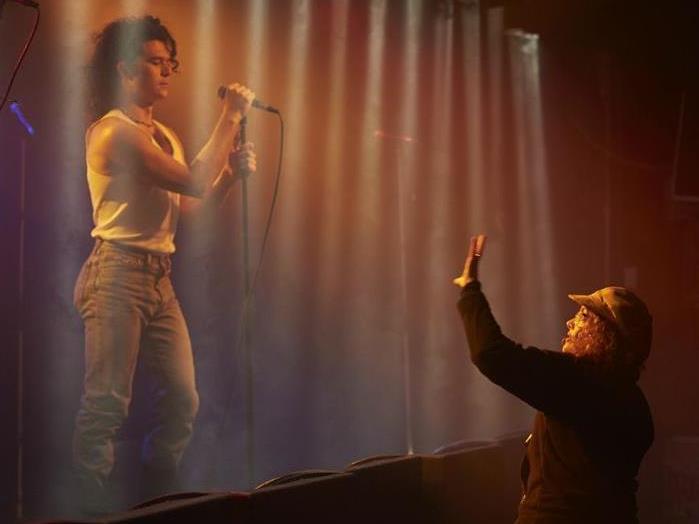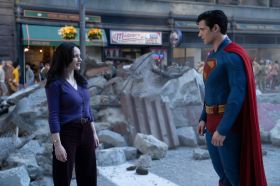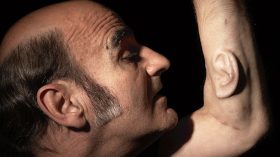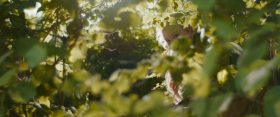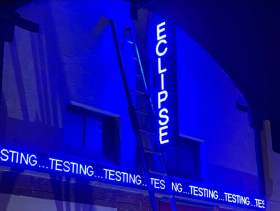Image: Daina Reid directs Luke Arnold on set of Never Tear Us Apart: The Untold Story of INXS (2014). Source: supplied.
If you’re old enough to remember the heyday of Aussie TV comedy in the mid ‘90s, you may recall seeing Daina Reid as the funny girl with the blonde ringlets on shows like Jimeoin, Full Frontal and The Micallef Program. But in one of the more unexpected performer-turned-director career stories, Reid has spent the last twenty-odd years becoming one of our busiest and most respected television directors.
Her credits include (to name just a few): Romper Stomper (Stan), Sunshine (SBS), The Dr Blake Mysteries (ABC), Rush and The Wrong Girl (Ten), as well as miniseries and telemovies like The Secret River, INXS: Never Tear Us Apart and Paper Giants: The Birth of Cleo. A five-time AACTA/AFI Award nominee, Reid was the 2017 recipient of the Australian Director’s Guild’s Michael Carson Award, presented for her overall contribution to Australian TV drama directing.
But in 2018, Reid’s profile took another huge boost when she turned up as one of the directors on Season Two of Hulu’s Emmy Award-winning US drama, The Handmaid’s Tale. It was her first time directing outside of Australia and this experience has launched her into a whole new set of international opportunities, the logistics of which she is currently grappling with as she grabs a moment to talk to Screenhub – before jumping on a plane to get back to the US to work on another TV series. She can’t talk about it yet, but we will reveal this: it’s not the kind of story you’d immediately associate with an Australian female director.
She’d been thinking about working in the States for a while. Her friend and colleague, Australian director Kate Dennis, had worked on the first season of Handmaid’s Tale and been nominated for an Emmy no less. ‘I had been chatting to her about the idea of what would happen if I went,’ says Reid, and so I did a trip over there and was fortunate enough to get a US agent, through my Australian agent (Jennifer Norten at Robyn Gardiner Management) who got me this job. I guess the producers might have thought, ‘We’ve already had one Australian director and she was alright, so let’s try another one!’
The sheer quantity of television being produced in the US right now means that productions are drawing cast and crew from all over the world to fill demand. As for why Australian female directors are getting great gigs like this, Reid says it’s all theoretical, but she does wonder if producers are finding it difficult to locate experienced female directors already working at a high level. ‘Maybe in the US they haven’t been nurtured enough to come through the ranks yet, and for whatever reason, Australia has lots of great working directors who are women.’
(The stats suggest there could be something in this. According to Women in Hollywood, in 2017 about 17 per cent of directors working in TV were women in the US, whereas in Australia, our most recent estimates put female TV directors around 26 per cent.)
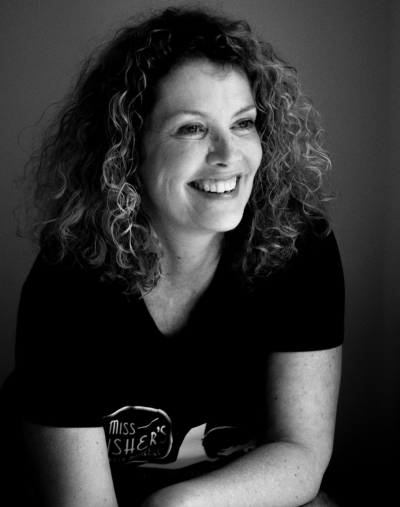
The two episodes of Handmaid’s Tale Reid directed were key ones, Episode 11 (‘Holly’) and 12 (‘Postpartum’), perhaps the most gut-wrenching and suspenseful chapters of an almost unbearably gut-wrenching and suspenseful show. Asked what differences she found working outside of Australia for the first time, Reid says, ‘the methodology is exactly the same. When I was on set working with the actors it all feels quite familiar except that it was extremely cold. That was not familiar in any way!’
If you’ve seen the relevant episodes you know they take place in a white world, icy with snow and cold with fear. It was minus 20 degrees on Reid’s first day of shooting in Toronto, and she immediately realised she’d need a better jacket.
There may not be too many obvious similarities between the dystopian future ofThe Handmaid’s Tale and the historical settler tragedy of the ABC’s Kate Grenville adaptation The Secret River, but Reid says she drew on that previous experience to pitch for the job.
‘In both stories, it’s one character’s very personal experience,’ she says. ‘Both stories come from established novels, and the thing about novels is that you often get access to the character’s inner monologue, the workings of their inner mind, and you’ve got to find a way to make that translate onto screen. With Handmaid’s Tale we had the voice-over and a lot of it was taken from Margaret Attwood’s book in series one, but you also had the visual style of being so close, with that lovely shallow depth of field. You’re kind of underneath those wings in that bonnet with June. In that tiny space between the edge of her face and her bonnet, that’s her world. With Secret River, I had the same conundrum of how do I portray what this character is feeling about seeing this piece of land that he wants to settle on? Sure, he talks about it with his wife, but it’s his own very personal emotional journey. So we chose a similar way of portraying that with lots of shallow depth of field and close-ups, as well as the wide shots of the landscape.’
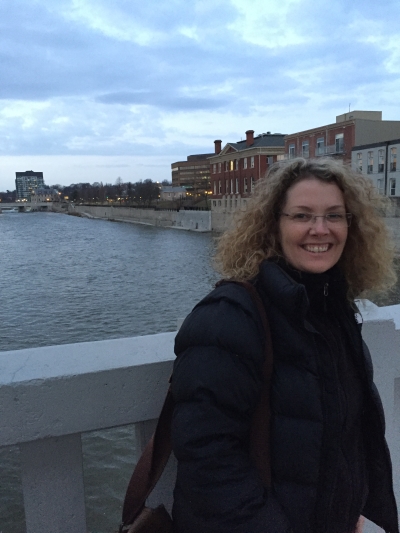
Image: Reid by ‘the wall of Gilead’ on location for Handmaid’s Tale.
Is it possible to work globally as a person with a young family?
The question is familiar to many in the industry. ‘We’re trying to work that out now,’ Reid says with a laugh. Currently based in Melbourne, where she lives with her husband and two school-aged children, she was away for ten weeks in one stretch working on The Handmaid’s Tale. ‘It’s a really hard juggle to work out how to stay together when there’s so much travel, and it’s a problem for fathers as well as mothers. It used to be accepted that that’s just what men do, but why should they have to be estranged from their families as well, just because of gender?’
Reid remembers her own upbringing where her electrician father would be away for huge stretches at a time up north in WA, setting up the wiring in towns for mining. ‘He’d be gone for months and months and months at a time,’ she says. ‘Of course mining is still happening, but it’s now two weeks on, two weeks off, because that industry realised you couldn’t be away from your families for that long.’
Shooting television poses particular challenges according to Reid. ‘It’s difficult to relocate too, because all these different shows shoot in different cities. It’s not like they’re all shooting out of one place, so where do you choose to live? You’re going to go and travel anyway so it’s a big conundrum, especially once the kids reach school age and they need that stability.’
The ‘Woman Questions’ – we hate that we still have to ask them
Asked what advice she’d give to a young woman just starting out as a director, Reid says she recently had lunch with a young woman embarking on her first feature film. ‘I’ve gotta say we hardly talked about the gender stuff. I talked about lots of other things, the getting though the day, and managing the machine of the set, those kinds of things. I think every woman is already aware of what’s coming at you.’
Having said that, Reid admits that as she’s grown older she’s come to a startling realisation. ‘I used to just brush off condescension and prejudice because I thought it was because I was young and inexperienced. That helped me because I didn’t even attribute it to sexism. Now I know it was, because I’m older and more experienced and it’s still happening!’
Asked what this sexism and condescension actually looks like in practice, Reid says, ‘It’s a constant questioning of your ability and your choices. There’s an assumption that you can’t do it, that you’re not all over it. Which is quite hilarious.’
It’s not just in the workplace that this sexism is ingrained, but in the stories themselves, according to Reid. ‘There’s a big gap there between what’s actually happening in women’s lives compared to what we see on screen. Women have been running their show so well for so long, but our stories still show that we’re not. You still get this thing where you can have a strong female character, but the male character is the one that cannot be emasculated. You have to make sure that the bloke isn’t weakened in the storytelling. It’s a strong thing across both genders. It’s not just that men need to see a strong man on screen, it’s that women do too, in order to feel “safe”. We really need to get over that.’
Top tips for getting great performance
As a director with a background in performing (though being behind the camera was always part of her career plan), Reid says working with performance is her favourite part of the job. (Pre-production is her least favourite, because ‘everyone’s just overthinking everything and it’s so frustrating!) She says she has no hard and fast rules about working with actors because every performer is different. ‘You need to spend some time with them and just get a feeling for how they like to work,’ she says. ‘Whenever I’m working with actors, I’m not imposing my will on them; I’m waiting for what comes to me. When we start, I want to see where that actor is coming from first and how they like to work. For example, you work with one actor is who is better in ten takes, and another one who is better in two. But you need to structure your shooting day to make it works around that.’
Short films and director’s attachments – the launching opportunities that gave her a start
Reid’s first directing attachment was on the long-running cop show Blue Heelers in the late 1990s. She was working as an actor at Channel Seven on Full Frontal and the Blue Heelers editing suite was right next door. She made connections and started shadowing directors on the show. Then she made a Tropfest short film in 1999 called A Margherita with Hot Salami, starring her good friend and fellow West Australian, Frances O’Connor. ‘I made the short film just to see if I was barking up the right tree, and it got into the Tropfest finals, so that was really the little kicker for me that said this is the right path. And after that they gave me a job [directing four episodes] on Blue Heelers .’
So what should an aspiring director expect to get from the experience of shadowing Daina Reid? ‘What I teach them is how to run the machine,’ she says. ‘This is the set, this is how I break down the script, this is how I break down a production meeting. For example, I had an attachment on Handmaid’s Tale, and she was a theatre director from New York. So the creativity is all her own, she knows about that. But I could teach her how to run it, because when you’re all over the running of it, then you’ve got the freedom to be creative.’
Reid’s advice to those who are in shadowing placements is to watch and ask questions. ‘It’s easy for me to answer questions, because I have that knowledge.You’ll feel when it’s the right time to ask a question or when it’s better to stay quiet.’
How do you deal with a bad day on set?
The question of how to unwind and get on with the job after a bad day on set is an important one for key creatives. For Reid, having a good producer who has your back is ‘gold’. ‘For example, on Sunshine. if anything difficult had happened, the producers Anna McLeish, Sarah Shaw and Ian Collie were there for me to talk to, and that made such a difference because they were supporting me. Otherwise, it can be a pretty lonely old place if you don’t have that outlet to talk it through.’
It’s no wonder then, that Reid’s very secret feature film, a thriller, is currently in development with McLeish and Shaw’s Carver Films. We may be waiting a while though, if the prestige TV work continues to lure her away.
